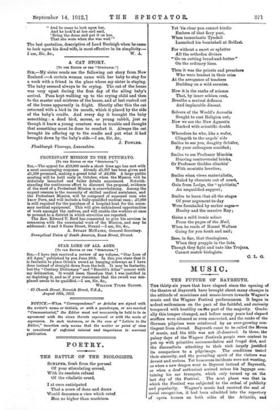THE MIGHTY MONOSYLLABLE.
[To THE EDITOR OE THE " SPECTATOR.'] SIR,—The article in your issue of August 31st on the use and effect of the "Mighty Monosyllable," by "J. F. R.," makes interesting and pleasurable reading. It reminds me of the precept of a schoolmaster of mine whose practice, so far as his conversation was concerned, was not in accordance with his teaching—that strength did not necessarily lie in the "big round words," or that the plain and small "must needs be weak." It is a striking but natural fact that when we diocese, either orally or in writing, questions of politics, religion, science, &c.—questions which divide us—we are apt to use ponderous polysyllabic words, as if in the hope that their very length would bridge over the gulf which separates Ia.
On the other hand, when we talk of things which unite us, or which are common to us all, such as life, death, love, friend- ship, domestic affairs, pastimes, &c., we confine our vocabulary, to a surprising extent, to monosyllables. I make these very obvious observations simply with the view of introducing the following quotations from Tennyson, as illustrating the use he makes of the monosyllable when describing or treating of some phase of human experience:— " But 0 for the touch of a vanish'd hand, And the sound of a voice that is still!"
d"Tis better to have loved and lost Than never to have loved at all." "And he came to look upon her, And he look'd at her and said, 'Bring the dress and put it on her, That she wore when she was wed."
The last quotation, descriptive of Lord Burleigh when he came to look upon his dead wife, is most effective in its simplicity.—







































 Previous page
Previous page